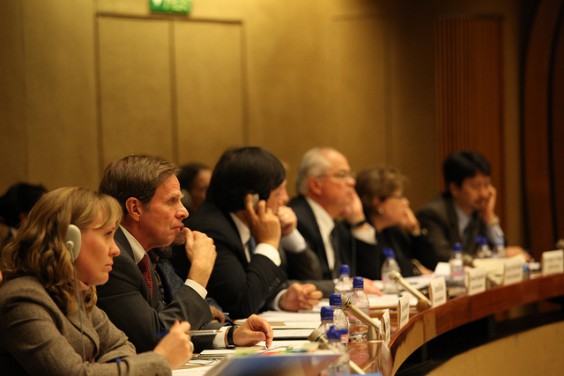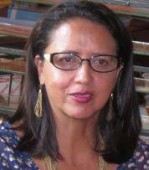Denying the Obvious to Blot the Sun Out with a Finger
by Dina Meza and translated by Nelson Eddingfield / April 27, 2015 / No comments

With the Universal Periodic Review of Honduras only three weeks away, the government is scrambling to claim it has made progress in protecting human rights.
Calling bread “bread,” and wine, “wine,” is normal in many countries, but forbidden in Honduras.
At this writing, there are still about three weeks until the state of Honduras will be subjected to the second cycle of the Universal Periodic Review (UPR). It remains to be seen whether the government will comply with the 129 recommendations that the Human Rights Council of the United Nations made to Honduras in November 2010.

- Honduras has one of the world’s highest murder rates. It is also one of the most dangerous countries to practice journalism, ranking 129th out of 180 in the 2014 World Press Freedom Index. Journalists are regularly threatened, attacked, and killed for their work. The Honduran government fails to punish those who use violence against reporters, essentially granting them impunity. This space will be dedicated to examining the lack of protection for Honduran journalists exercising their profession. Topics will include the use of state-sponsored advertising as a mechanism to reward or punish publications, and censorship and self-censorship as hindrances to democratic progress.

- Born in Cofradía, Honduras, Dina Meza has been recognized by PEN International, Amnesty International, Index on Censorship and Reporters without Borders for her work as a journalist and human rights advocate. Currently, Dina is the driving force behind the creation of Honduras PEN Centre. In 2013, she wrote “Reign of Terror,” an in-depth report on threats to Honduran journalists for Index on Censorship’s magazine. In 2014, she was named one of Reporters Without Borders’ “100 Heroes and Heroines of Information.”
Honduran civil society organizations, accompanied by their international peers, recently arrived in Geneva for the pre-UPR. These groups include La Red de Derechos de la Niñez y la Juventud, COIPRODEN (The Network for the Rights of Children and Youth); Asociadas por lo Justo (Partners for Justice); Franciscan Honduras; PEN Honduras; and La Coalición contra la Impunidad (The Coalition against Impunity from Justice). PEN International and Franciscan International, Article XIX, provided support.
Each of these organizations declared to the Human Rights Council that Honduras is in the middle of a human rights crisis.
As for myself, I was called on to participate with PEN Honduras and explain that freedom of expression is under serious threat. In 91 percent of cases where a reporter is assassinated, there are no judicial repercussions; dozens are threatened, others go into exile, and the vast majority opt for self-censorship in order to protect their own lives.
Before the Honduran delegation arrived at Geneva, the governor of the republic conducted a media campaign to discredit what these organizations would say before the Human Rights Council. They claimed that political parties that wanted to cause harm to the government had put into motion a defamation campaign against the Honduran state.
Something similar happened in the ‘80s, when various sectors reported that grave violations of human rights had been occurring, such as forced disappearances. At that time, anybody who spoke out against what was happening was denounced as being affiliated with communism.
The state of Honduras sent a report to the Human Rights Council, stating that the majority of the 129 recommendations had already been implemented.
Among Honduras’s accomplishments, the report listed the arrival to the country of advocates for freedom of expression, and argued that the government had started an initiative for the rights of women and the protection of human rights. However, what the report did not say was that the advocates had come to Honduras to denounce the grave violations of human rights that the government had committed. And it did not mention that the recommendations the advocates had made were far from completion.
Another of the accomplishments the state declared was the approval of a National Action Plan for Human Rights, another law that has remained a dead letter, having never being applied.
Similarly, the government keeps its law protecting journalists, human rights defenders, and judicial officials as a card up its sleeve. This law has been shelved for about two years, and is only brought out when there are international criticisms of non-compliance with the UPR’s 2010 recommendations. At present, it is still officially under consultation; some items are still lacking before it can be approved. However, it is very certain that on May 8, when Honduras goes to the 2015 UPR in Geneva, this law will be promoted as another fulfilled promise.
In a commission’s discussion on this law, a deputy of the government part in power pointed out that when people who live outside the capital are threatened, there are no offices responsible for providing protection. They have to go to the nearest police station to file a report, and the police send the report to an office charged with providing protection.
It is terrible when, as in the majority of cases, the perpetrators are agents of the state. It is very probable that what is happening now with the reports of human rights violations is that the perpetrators of human rights violations are being tipped off by the Public Ministry or the police. They threaten the victims into dropping the accusation.
The combination of claiming defamation campaigns and a poor international image does not paint a convincing picture of the government’s commitment to reduce impunity from justice, but is rather a sign of the weakness of the arguments advanced by the state to the Human Rights Council.
Ideally, instead of sending a reactive response, the government would be proactive. This is to say that instead of trying to intimidate those who make accusations, the state would listen, evaluate and act against those who are responsible, but this does not happen. Instead the obvious is denied in order to cover up the truth.




